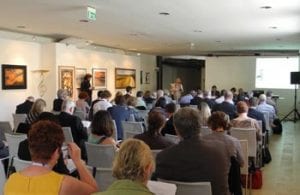At the 21stFiesole Retreat in Florence, Italy on April 3-5, 2019, industry participants gathered to discuss the future of libraries, publishing, collections and scholarship. A key message woven throughout the event was the importance of digital transformation in scholarly communication. Namely, the ways in which academic and commercial research is delivered so that people can access it is undergoing tremendous changes. As participants from all sectors of the information cycle focused on how access and usage issues could be improved to benefit researcher efficiency, optimise the use of grant funding and improve the dissemination of results, it became clear that the issues being addressed align well with similar issues that business verticals are experiencing regarding risk and compliance in financial services and across the media industry.

A big part of the retreat’s value is that it brings leaders such as librarians, researchers, publishers, data-development players and technology and information providers into the same room. The result is an enhanced appreciation of the fact that the industrial structures of the Age of Gutenberg (the printing press) are hard to reconfigure in the Age of Data. Discovery, access, re-use, dissemination, impact—it is easy enough to rehearse the critical problems of scholarly communication, and they have parallels wherever digital transformation has been an issue. But it is really hard to move quickly in markets where:
- Much of the research reporting data is behind paywalls
- The evidential data is in university or research group repositories
- No uniform access for text and data mining exists
Refocus on Data Access
The meeting concentrated on efforts currently being made to refocus data access. The plan put forward by 11 European countries with the Gates and Wellcome Foundations—two of the largest private funders of life sciences and healthcare research—to ensure that research results from their funded programs are only available from purely open access journals, threatens both the big publishers and, more rapidly, the scholarly societies that depend on paid-for journal revenues. And in an industry sector that has done more than most to improve discovery by launching joint ventures to create standards and provide certainty in identification (things like CrossRef on digital object identifiers or Orcid on author disambiguation), it remains clear that much new metadata and linked data application will be required to make the research world even reasonably connected. And in many other sectors, we are even further behind the need.

But much discussion polarised on dissemination and impact. The importance and ranking of scientific research will change radically in 20 years. Tracking the life of an article or a report and looking at the metrics of downloads and usage, for example, is one of several avenues for exploring usage to create new data flows to record influence and impact, just as tracking user journals and buying behaviours gains importance in other sectors.
Indeed, a huge amount of digital transformation has taken place in this industry, but because it is still organised to produce books, articles and journals, a costly bridge has to be built to make everything fit onto the researcher’s screen. But as we build that bridge, facilitate user access and discovery and prepare for more intelligent data integration in machine learning and AI, we realise that digital transformation itself is a re-iterable process and not a one-off. Five years ago, scholarly communication seemed rich in databased services and transformational activity. Today, it seems like the foot of the hill, and delegates are left with a good view of how arduous that ascent would be.
Those of us in publishing are advised to stay tuned, as this conversation on digital transformation in our industry will continue and evolve.
David Worlock was there at the invention of digital databases, and has been present through every major shift, remaining a singular voice of innovation in the industry.
David Worlock
There at the invention of digital databases, and present through every major shift, David Worlock remains a singular voice of innovation in the industry.

Latest Stories in Your Inbox
Subscribe to get all the news, info and tutorials you need to build better business apps and sites
